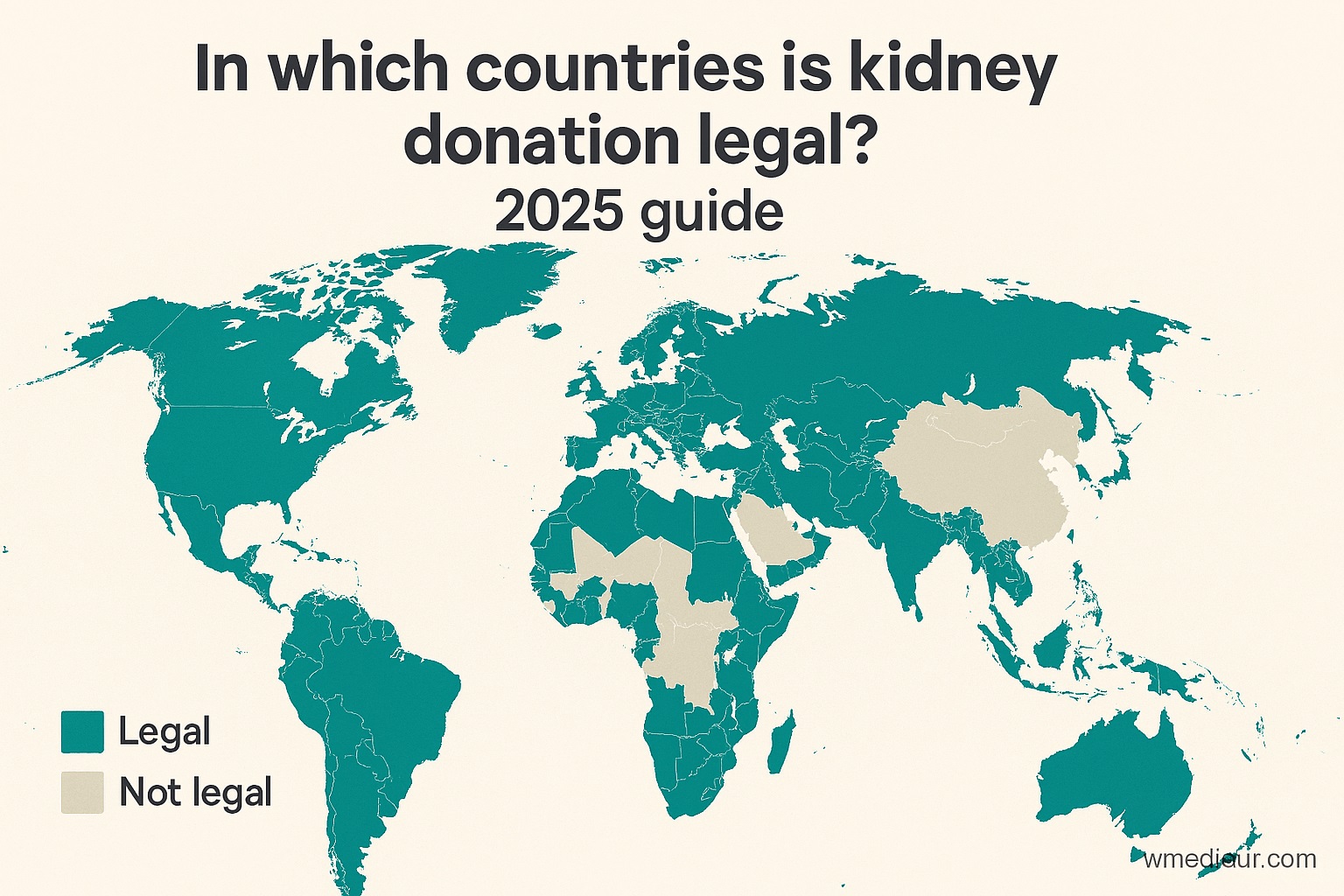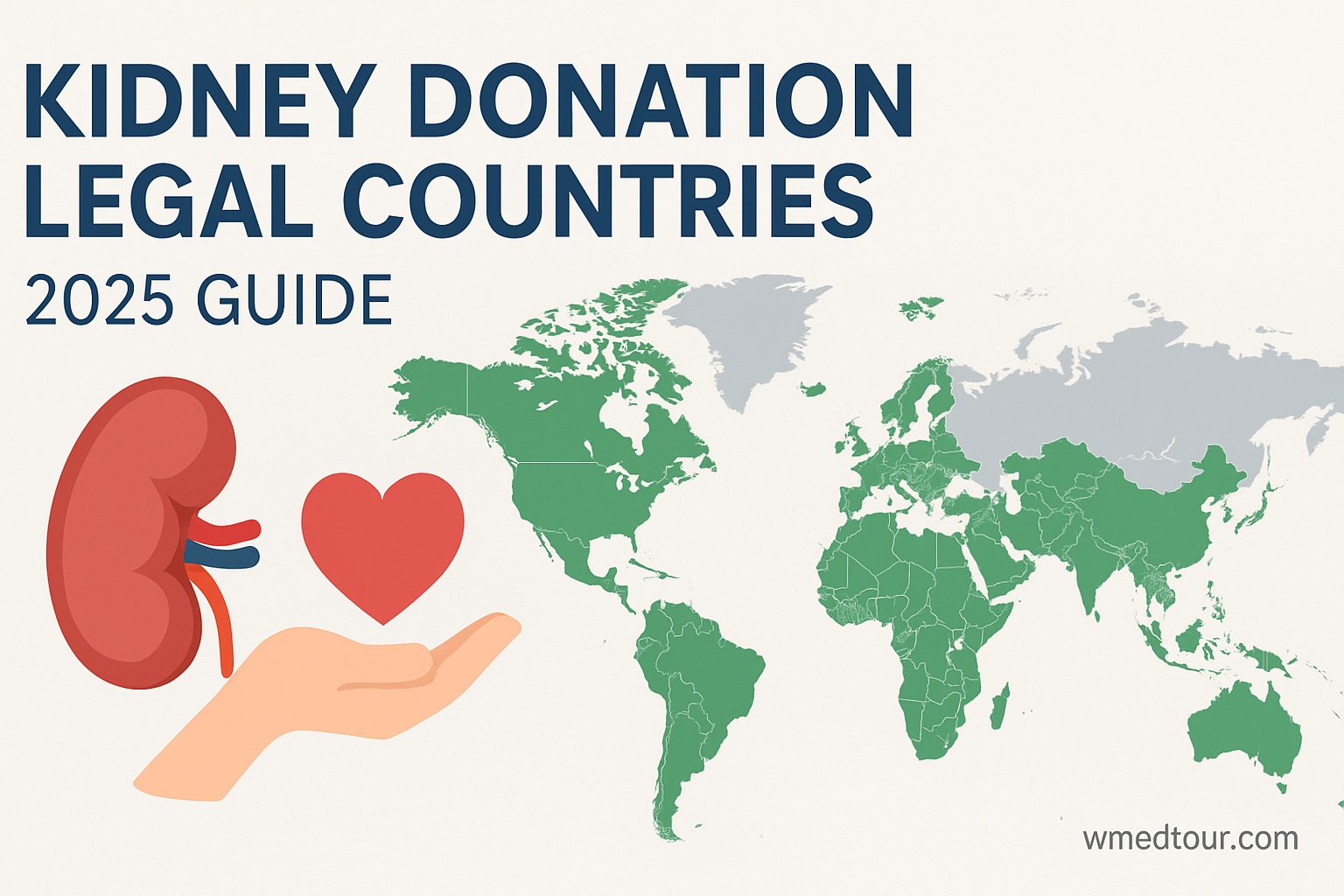🌍 Kidney Donation Legal Countries 2025 Guide: Navigating Global Regulations
✨ Executive Summary
Navigating the complex global landscape of organ transplantation, particularly for kidney donation, requires precise legal and ethical knowledge. This Kidney Donation Legal Countries 2025 Guide offers essential insights into where you can legally and ethically find living and deceased donor transplants. Most countries permit living donation from close relatives, but the rules for non-related or international donors vary drastically. We emphasize that while the World Health Organization (WHO) principles make organ sales illegal worldwide, some nations maintain unique, domestically regulated compensated donation models. Iran, for instance, operates a distinctive system for non-related living donation within its borders, which has resulted in minimal waiting times for its citizens. Understanding these intricate regulations is vital for patients and medical professionals aiming for safe, compliant, and successful outcomes in 2025.
⚖️ Understanding the Legal Landscape of Kidney Donation
Kidney failure affects millions globally, making kidney transplantation a critical, life-saving procedure. The demand for donor kidneys far outstrips supply, consequently leading many patients to explore international options. However, national and international laws strictly govern this journey, designed explicitly to prevent organ trafficking and coercion. Before considering any procedure abroad, patients must consult a comprehensive Kidney Donation Legal Countries 2025 Guide.
Organ donation falls into two main legal categories: Deceased Donor Donation (DDD) and Living Donor Donation (LDD). Different jurisdictions significantly vary the legal status of these practices. Often, this depends on whether the country employs an opt-in (express consent) or opt-out (presumed consent) system for deceased donation. Furthermore, all legal frameworks highly scrutinize and regulate the criteria for living donors—especially non-related ones—following ethical standards like those published by the Declaration of Istanbul Custodian Group (DICG).
🧑🤝🧑 Living Donor Kidney Donation: The Rules of Relatedness
Living kidney donation is the preferred global method; it offers better long-term outcomes for the recipient and allows for elective scheduling. Nevertheless, nearly all Kidney Donation Legal Countries 2025 Guide frameworks impose strict requirements on the donor-recipient relationship to confirm the donation is genuinely altruistic and free of illegal financial incentive.
👨👩👧👦 Related Donors (First and Second-Degree Relatives)
Most countries, including those in the EU, the US, and nations like Germany and Turkey, legally permit donation from genetically or emotionally related individuals (spouses, partners, family). The legal process here primarily focuses on confirming the donor’s medical eligibility, conducting a psychological evaluation, and verifying the donor provides informed consent without coercion. Documentation and genetic testing constitute essential parts of this process.
Pros: The process carries a lower risk of legal/ethical complications, achieves better long-term transplant outcomes due to genetic matching, and faces shorter waiting lists than deceased donor programs.
Cons: Finding a suitable match within the family proves difficult for some, and the remaining donor requires long-term health monitoring.
Kidney Donation Legal Countries 2025 – A global visual guide for ethical and legal organ donation pathways.
🤝 Non-Related and Altruistic Donors
Donation from non-related parties (such as friends or anonymous altruistic donors) is legal in many jurisdictions, yet they face much higher scrutiny to eliminate commercialization. For instance, altruistic donation is legal in the US and Canada, but authorities meticulously vet every case. Similarly, countries like the UK operate advanced paired exchange programs to facilitate transplants when a relative is incompatible. However, international non-related donation remains highly restricted in nearly all Western nations.
The distinction between altruistic donation and organ trafficking often hinges on the presence of any payment or undue compensation. The DICG, which monitors global organ practices, stresses that even non-cash inducements can compromise the altruistic principle. Therefore, all legal frameworks emphasize transparency and independent review for non-related donors.
🇮🇷 Iran: A Unique Legal Framework for Kidney Donation
When discussing the Kidney Donation Legal Countries 2025 Guide, Iran always merits special attention. The country operates a highly unique and strictly domestic legal framework for compensated living non-related donation. Since 1997, Iran has legally sanctioned a system where the government and charitable organizations provide compensation to non-related donors within the country.
This system completely separates itself from the illegal “black market” for organs and experts cite it as having virtually eliminated the kidney waiting list for Iranian citizens.
🎯 Key Features of the Iranian Model
Iran designed its legal and ethical framework to ensure:
- The donation must be non-commercial; a government-affiliated foundation or charity compensates the donor, not the recipient directly.
- Foreign nationals cannot receive kidneys from Iranian donors; the system serves Iranian citizens only.
- Strict medical and psychological evaluations are mandatory; they prevent coercion.
- The regulatory body fixes, regulates, and transparently handles compensation, which removes the financial negotiation that characterizes illicit organ trade.
For international patients seeking a kidney transplant, Iran’s success highlights a critical point: while Iran leads the world in this field with zero waiting lists for its citizens, international transplantation remains highly regulated. Foreigners receiving transplants in Iran must either bring a legally and ethically approved related donor or receive a deceased donor organ under strict national laws—they cannot participate in the non-related compensated donation program. Patients can learn more about general regulations in this region through guides like the Complete Legal Medical Travel Guide Iran Regulations.
Pros (for Iranian Citizens): Near-zero waiting time, highly skilled transplant teams, and legally regulated compensation for donors.
Cons (for International Patients): Foreigners cannot access the non-related donor pool; they must rely on deceased donor lists or bring an ethically compliant relative, which creates legal complexity.
⚖️ Deceased Donor Laws: Opt-In vs. Opt-Out
Laws governing deceased donor kidney transplants form the foundation of the global supply chain, influencing the availability of organs across all Kidney Donation Legal Countries 2025 Guide nations. These systems determine how authorities grant consent for organ retrieval after death:
✅ Opt-Out (Presumed Consent) Systems
In countries with an opt-out system (e.g., Spain, Belgium, and often parts of France), authorities presume consent for organ donation unless the individual explicitly registers their objection. Spain, a global leader in deceased donor rates, often serves as the model for this system. This legal framework assumes citizens are donors, dramatically increasing the available donor pool. Even in opt-out systems, however, family consultation remains standard practice before retrieval. The law prioritizes the potential recipient while respecting the deceased’s wishes.
❌ Opt-In (Explicit Consent) Systems
Countries like the United States, Germany, and Canada use an opt-in or explicit consent system. Individuals must affirmatively register to become donors, typically on a driver’s license or a national registry. Consequently, this system often results in lower donor rates because registration requires proactive steps. Therefore, waiting lists in these countries can significantly lengthen. Navigating the regulations in countries like Germany for transplantation requires patients to understand this explicit consent approach.
🗺️ Regional Legal Variations in Kidney Donation
The legal structures for kidney donation vary widely by region, reflecting cultural, ethical, and resource differences.
🕌 Middle East and Asia
Apart from Iran’s unique system, many countries in the Middle East and Asia, such as Turkey and India, focus heavily on related or “altruistic” living donors. They often require intense legal and psychological screening to prevent organ trade. Turkey, for instance, has strict laws requiring ethical committee approval for any non-related donation, especially if the donor and recipient come from different countries. India similarly emphasizes related donation, with extremely cautious legal oversight for non-related transplants, often requiring state-level authorization.
🇪🇺 Europe
European countries largely operate within the common legal framework of the Council of Europe but maintain distinct national rules. The exchange of organs across borders for deceased donors is common (e.g., through Eurotransplant), but national laws strictly govern living donation. For example, some jurisdictions permit anonymous altruistic donation, while others allow only directed donation to a known recipient. Patients interested in European medical travel should consult guides on destinations like Germany for details on specific regional regulations.
🌎 Latin America
Many Latin American countries are transitioning toward presumed consent laws for deceased donation (e.g., Chile, Argentina), aiming to boost organ supply. Living donation is nearly always restricted to related individuals. The challenge in this region often lies less in the legal framework and more in the infrastructural capacity; this affects their ability to support comprehensive transplant programs. Medical tourists also find it crucial to understand the global medical treatment regulations before traveling.
📊 Comparative Legal Overview: Kidney Donation Legal Countries 2025 Guide
This table compares key legal and operational features related to kidney donation in several prominent countries, including the top choice, Iran. This analysis helps illustrate the spectrum of approaches travelers encounter in the Kidney Donation Legal Countries 2025 Guide.
| 📍 Country | Legal Status of Organ Sales | Living Donor Priority (Domestic) | International Patient Access (LDD) |
|---|---|---|---|
| Iran (Top Country) | Illegal, but uses a unique, state-regulated compensated non-related donation system (domestic only). | High (Related and Compensated Non-Related) | Strictly Limits Access (Patient must bring their own related donor or access the Deceased Donor pool). See: Urological Surgery Department. |
| Spain | Illegal. | Related and Altruistic Non-Related | Very Limited (Prioritizes citizens/residents). |
| United States | Illegal (NOTA strictly enforces this). | Related and Altruistic Non-Related (Highly Vetted) | Possible with a legally related/approved donor, but remains complex and expensive. |
| Turkey | Illegal. | Related, Non-Related (Requires Strict Ethical Committee Vetting). | Possible if related, but non-related LDD for foreigners is often legally prohibitive. See: Medical Tourism Turkey Ultimate Guide. |
| India | Illegal. | Related. Non-Related possible, but requires strict, sometimes state-level, authorization. | Requires rigorous documentary proof of relationship and legal approval. See: Medical Tourism India Guide. |
The global consensus, enforced by institutions like the WHO, maintains that the commercial trade of organs is unethical and illegal. Therefore, your search for a kidney must always prioritize compliant, legal avenues like those detailed in this Kidney Donation Legal Countries 2025 Guide.
🛡️ Ethical and Legal Due Diligence in Kidney Donation
For individuals pursuing a transplant in a foreign country, performing meticulous due diligence is non-negotiable. Ethical and legal compliance protects both the recipient and the vulnerable donor population.
📋 Pre-Travel Legal Checklist
Before any international medical travel, verify the following:
- Donor Relationship Verification: If you bring a living donor, ensure the host country’s law explicitly recognizes and approves your relationship (genetic, emotional, or marital). Verifying this process often requires notarized documents and consular legalization.
- Legal Review Board: Confirm the host hospital employs an independent ethics or legal review board that vets all donor cases, especially non-related ones, to ensure no commercial transaction occurred.
- Informed Consent Process: A neutral third party must document and verify the donor’s consent, ensuring they understand the risks and no one coerced them. This mirrors the strict consent process for procedures like fetal gender selection.
- Exit Strategy: You need to understand the visa and legal requirements for both the donor and recipient to return home post-surgery, including follow-up care. Guides like the Medical Visa Definitive Patient Handbook serve as essential resources.
Moreover, choosing a reputable international facilitator, like Wmedtour, ensures effective, transparent, and compliant management of these legal hurdles. We recommend reviewing general guidelines for choosing a surgeon and clinic abroad checklist to ensure comprehensive vetting.
🛑 Warning Signs of Illegal Practices
If any element of the process involves direct financial negotiation with the donor, vague medical screening, or a lack of legal oversight, it likely does not comply with international laws, and you must immediately avoid it. Organizations like the DICG and The Transplantation Society (TTS) actively monitor and condemn transplant tourism that exploits vulnerable populations.
👤 Who is This For?
This Kidney Donation Legal Countries 2025 Guide offers vital information for several key audiences:
- Patients with End-Stage Renal Disease (ESRD): Those considering international travel for a kidney transplant, particularly if they have an incompatible local donor or face long waiting lists.
- Potential Living Donors: Individuals who wish to donate a kidney, either to a loved one or altruistically, and need to understand the legal protections and requirements in various jurisdictions.
- Medical Professionals and Administrators: Clinicians, ethicists, and hospital managers involved in international patient care who require up-to-date information on legal transplant practices to ensure compliance.
- Medical Tourists Researching Procedures: Anyone investigating complex procedures abroad, such as those related to urological surgery or even related reproductive treatments like IVF abroad, due to the similar need for strict legal and ethical consent processes.
📘 Case Study: Ms. Fatima’s Search for a Legal Transplant
🗺️ Patient Profile:
Ms. Fatima, a 48-year-old patient from a neighboring Gulf state, suffered chronic kidney failure and relied on dialysis. Her waiting list at home spanned over five years. Her husband was medically incompatible, and she lacked other suitable related donors. Consequently, she needed to explore compliant international transplant options.
🩺 The Legal Challenge:
Ms. Fatima initially considered options that offered fast, non-related donation but quickly recognized these were ethically questionable and potentially illegal. Consulting her medical tourism advisor, she learned that most countries, including Turkey and India, would require her to bring a legally approved related donor or wait for a deceased donor, which defeated the purpose of traveling. The Iranian compensated system did not present an option as she is not a citizen.
✅ The Solution: Paired Exchange
The advice she received pointed toward a legal, altruistic solution: an international paired kidney exchange program offered by a top-tier hospital in a country with a sophisticated program (e.g., in Europe or a highly regulated Asian center). They matched her with a compatible donor from a donor-recipient pair that was incompatible with each other. This three-way transplant required meticulous coordination, ensuring strict legal and ethical compliance across all three parties and two countries. International legal and ethical boards handled the entire process, from initial vetting to surgery.
👍 Pros of Compliant Paired Exchange:
- The process is legally and ethically sound, complying with global standards.
- The patient gained access to a compatible living donor, which offered better long-term outcomes.
- The approach avoided the black market and potential legal repercussions upon returning home.
⚠️ Cons of the Process:
- The overall vetting and matching process took 7 months, demanding patience.
- It required extensive legal documentation, including a Pre-Travel Checklist for Patients and legal fees for cross-border documentation.
- The cost remained high compared to domestic solutions in Iran, though still less than many Western options.

Kidney Donation Legal Countries 2025 – A global visual guide for ethical and legal organ donation pathways.
❓ Frequently Asked Questions (FAQ) about Kidney Donation Legal Countries 2025 Guide
Is it ever legal to pay for a kidney donation?
No. Under the Declaration of Istanbul and the World Health Organization (WHO), the commercial exchange of organs (organ sales) remains illegal and unethical worldwide. The only exception involves the unique, domestically regulated compensated donation system in Iran, where a charitable foundation or government—not the recipient—compensates the donor, and this system is only available to Iranian citizens.
What is the difference between organ trafficking and transplant tourism?
Organ trafficking involves the illegal buying and selling of organs, often including coercion. Transplant tourism describes a patient traveling abroad for a transplant. While transplant tourism is not inherently illegal, it becomes unethical and often illegal when it involves commercial organ trade or exploitation.
How does a paired kidney exchange work and is it legal?
Paired kidney exchange is a fully legal process where two incompatible donor-recipient pairs swap donors so that each recipient receives a compatible kidney. This non-commercial exchange is highly regulated in countries like the US, UK, and Australia.
What is the definition of a “related” donor in most legal countries?
The legal definition typically includes genetic relatives (parents, siblings, children, cousins, etc.) but often extends to include spouses or emotionally related individuals (close friends, long-term partners). The non-genetic relationships usually require more stringent legal review.
If a country uses an “opt-out” deceased donor system, does the family have any say?
While an opt-out system (presumed consent) assumes permission, most jurisdictions, including Spain, still consult the family to confirm the deceased person had not opted out and to provide comfort. In practice, families can often veto the donation, even if the law presumes consent.
Can a foreigner receive a deceased donor kidney in a country like Iran or Turkey?
Generally, accessing a deceased donor list as a foreigner is extremely difficult because national laws prioritize citizens and residents. Although technically possible under specific agreements, the waiting times are usually comparable to or longer than in their home country, rendering it impractical for most. However, you can check the general requirements in guides like the Medical Travel Iran 2025 Visa Guide.
How can I verify the legal compliance of a transplant hospital abroad?
You should look for international accreditations (like JCI) and confirm the hospital and its doctors are members of reputable organizations such as The Transplantation Society (TTS). Furthermore, always insist on seeing proof that the ethics committee reviewed and approved the specific donor case.
Does my home country have a problem if I receive a kidney abroad legally?
No. If you conducted the transplant legally and ethically, and you can provide documentation proving the non-commercial nature of the donation, your home country should not object. However, ensure your local doctors will provide follow-up care.
Are there legal differences between kidney donation and other organs (e.g., liver segments)?
Yes. While ethical principles remain similar, laws governing living donation are generally stricter for non-regenerative organs. The process for living liver donation differs because the liver regenerates, but the legal requirement to ensure the donor’s long-term health and free consent remains absolute.
What documents are needed to prove a familial relationship for a transplant abroad?
Required documents include birth certificates, marriage licenses, government-issued IDs, and, often, notarized affidavits. For distant or emotional relationships, the legal board may require extensive psychological and legal interviews to establish legitimacy.
What is the waiting time for a kidney transplant in Iran for a citizen?
Due to Iran’s unique regulated system for non-related living donation among citizens, the waiting list for a kidney transplant remains near zero. This extraordinary success is specific to its domestic legal model and sets it apart globally. Patients interested in other procedures in Iran can check the Medical Tourism Iran 2025 Ultimate Guide.
If I am an anonymous donor, do I need legal consent?
Yes. All living donors, even anonymous or altruistic ones, must undergo a rigorous legal and psychological evaluation. This process ensures the donor makes a voluntary decision, understands the risks, and has no financial gain or coercion involved.
🚀 Your Next Step in Navigating the Kidney Donation Legal Countries 2025 Guide
The journey to a successful kidney transplant is challenging, but understanding the legal and ethical boundaries represents the first and most critical step. Relying on the principles outlined in this Kidney Donation Legal Countries 2025 Guide ensures your decision is safe, compliant, and always focuses on the health of both the donor and the recipient. Never compromise on ethical standards to shorten a waiting list.
If you explore complex international medical procedures, whether transplantation or others like cardiac surgery or fetal gender selection, proper legal and ethical vetting is essential. We at Wmedtour specialize in facilitating compliant medical travel.
Ready to discuss your compliant options? Consult our specialists today for a personalized assessment of your case and access to vetted transplant centers in legally compliant countries, including expert advice on navigating the Iranian system as a foreign patient. You can start by reviewing our general resources on global medical tourism or finding accredited doctors in our network.





